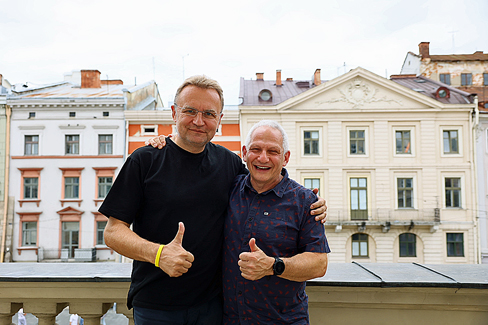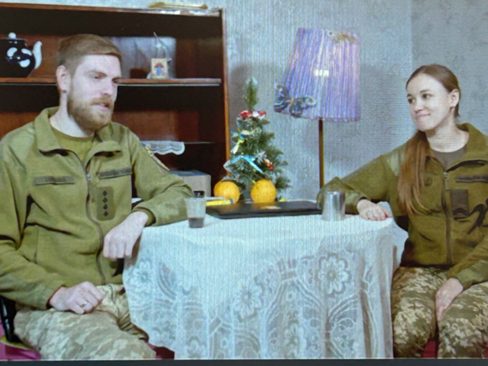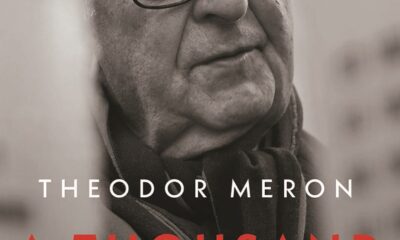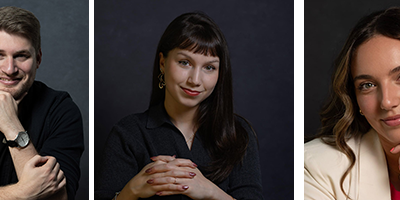Features
“To The Zero Line” – new film by Ben Goldhagen about war in Ukraine

By MARTIN ZEILIGU.S. filmmaker Ben Goldhagen has made a moving and daring documentary about the horrific and destructive war that is currently taking place in Ukraine. To The Zero Line tells the true stories of Ukrainians who have been forced to flee their homes, lose loved one, and live in fear for their lives because of the illegal and unprovoked invasion, which was launched on February 24, 2022, by the Russian Federation.
“It is a story about the courage, strength of will, and resilience of the Ukrainian people,” Mr. Goldhagen said, during an email interview with The Jewish Post & News.“
At stake are the hospitals, churches, music, art, children, pregnant women, expectant fathers, against a force determined to murder all of it. It’s genocide.
“You experience the perpetual cycle of life of the invaded, the birth of two children, a wedding, death, the loss of a loved one, Soldiers in battle on the zero line, and back in the cities, towns and villages each person has his or her own personal zero line.
”You also experience people from outside the country flooding in to help in what ways they can, each adding a small part to a big puzzle. “You might ask yourself: How am I so different?” said Mr. Goldhagen, whose father survived the Holocaust, and whose brother is renowned social scientist, Daniel Goldhagen (the author of the 1996 book, Hitler’s Willing Executioners: Ordinary Germans and the Holocaust.)

“What would I do if death comes knocking on my door or my parents’ door or my school door or my church’s door? The film is an opportunity to think for yourself.” Among the many individuals interviewed in the film is a young female Israeli paramedic, Shir, working in Ukraine to help wounded soldiers.
“When I was making the film some people in the West wondered if a woman with an Israeli flag would stir some hate for the film,” Mr. Goldhagen said. “My response has always been, then they will hate. We cannot be silent. There are hundreds of Jews who have come to assist Ukraine. There’s tikkun olam, and there’s something more and it’s said by Shir, the woman in the film. This is where many of our ancestors lived and we want to help the people there now, even if some of them were against us then.
“Some saved us, like Traiain Popvichi, the mayor of Chernivtsi who saved my father, and my father’s mother and father, so we want to act, not just talk, about helping in a time of peril, and by so doing it shows the world that we can forgive and not stand by even though there has been past aggressions towards us as Jews. “These righteous Jews went to Ukraine to help prevent in what way they can for the same fate we suffered and as Shir says ‘”maybe we can make a better world”’…for sure for the individuals we touch, if it is only one tourniquet at a time.”
War focuses the mind on the essence of life—family, friends, food, heritage, “what you’ll fight for, what you might die to keep,” the choices one makes each morning when the sun rises,” Mr. Goldhagen wrote.“The film is available for free streaming worldwide, so everyone outside Ukraine will know what the people inside Ukraine are experiencing, and to honor the many righteous people who are coming to their support against this genocidal national project of the Russian federation,” he said.
“For those with a few extra dollars, there’s a donate button that will aid some of the people you become acquainted with in the film. If you want to do more, share a link to this site with three friends. Hopefully, soon, the governments of the West will provide the quantity and the type of tools required for victory.” As Mr. Goldhagen writes, the people of Ukraine know, what Winston Churchill knew, that “Without victory, there is no survival.”
The film can be viewed at: www.tothezeroline.com
Features
A Thousand Miracles: From Surviving the Holocaust to Judging Genocide

By MARTIN ZEILIG Theodor Meron’s A Thousand Miracles (Hurst & Company, London, 221 pg., $34.00 USD) is an uncommon memoir—one that links the terror of the Holocaust with the painstaking creation of the legal institutions meant to prevent future atrocities.
It is both intimate and historically expansive, tracing Meron’s path from a child in hiding to one of the most influential jurists in modern international law.
The early chapters recount Meron’s survival in Nazi occupied Poland through a series of improbable escapes and acts of kindness—the “miracles” of the title. Rendered with restraint rather than dramatization, these memories form the ethical foundation of his later work.
That moral clarity is evident decades later when, on the seventy-fifth anniversary of the liberation of Auschwitz, he addressed the UN General Assembly and reminded the world that “the German killing machine did not target Jews only but also the Roma, Poles, Russians and others,” while honoring “the Just—who risked their lives to save Jews.” It is a moment that encapsulates his lifelong insistence on historical accuracy and universal human dignity.
What sets this memoir apart is its second half, which follows Meron’s transformation into a central architect of international humanitarian law. Before entering academia full time, he served in Israel’s diplomatic corps, including a formative posting as ambassador to Canada in the early 1970s. Ottawa under Pierre Trudeau was, as he recalls, “an exciting, vibrant place,” and Meron’s responsibilities extended far beyond traditional diplomacy: representing Israel to the Canadian Jewish community, travelling frequently to Toronto, Montreal, and Vancouver, and even helping to promote sales of Israeli government bonds. His affection for Canada’s cultural life—Montreal’s theatre, Vancouver’s “stunning vistas”—is matched by his candor about the political pressures of the job.
One episode proved decisive.
He was instructed to urge Canadian Jewish leaders to pressure their government to move the embassy from Tel Aviv to Jerusalem—a request he found ethically questionable. His refusal provoked an attempt to recall him, a move that reached the Israeli cabinet. Only the intervention of Finance Minister Pinhas Sapir, who valued Meron’s work, prevented his dismissal. The incident, he writes, left “a fairly bitter taste” and intensified his desire for an academic life—an early sign of the independence that would define his legal career.
That independence is nowhere more evident than in one of the most contentious issues he faced as legal adviser to the Israeli Foreign Ministry: the legal status of Israeli settlements in the occupied West Bank. Meron recounts being asked to provide an opinion on the legality of establishing civilian settlements in territory captured in 1967.
His conclusion was unequivocal: such settlements violated the Fourth Geneva Convention as well as the private property rights of the Arab inhabitants. The government chose a different path, and a wave of settlements followed, complicating prospects for a political solution. Years later, traveling through the West Bank, he was deeply troubled by the sight of Jewish settlers obstructing Palestinian farmers, making it difficult—and at times dangerous—for them to reach their olive groves, even uprooting trees that take decades to grow.
“How could they impose on Arab inhabitants a myriad of restrictions that did not apply to the Jewish settlers?” he asks. “How could Jews, who had suffered extreme persecution through the centuries, show so little compassion for the Arab inhabitants?”
Although he knew his opinion was not the one the government wanted, he believed firmly that legal advisers must “call the law as they see it.” To the government’s credit, he notes, there were no repercussions for his unpopular stance. The opinion, grounded in human rights and humanitarian law, has since become one of his most cited and influential.
Meron’s academic trajectory, detailed in the memoir, is remarkable in its breadth.
His year at the Max Planck Institute in Heidelberg (1984–85) produced Human Rights Law–Making in the United Nations, which won the American Society of International Law’s annual best book prize. He held visiting positions at Harvard Law School, Berkeley, and twice at All Souls College, Oxford.
He was elected to the Council on Foreign Relations in 1992 and, in 1997, to the prestigious Institute of International Law in Strasbourg. In 2003 he delivered the general course at the Hague Academy of International Law, and the following year received the International Bar Association’s Rule of Law Award. These milestones are presented not as selfpromotion but as steps in a lifelong effort to strengthen the legal protections he once lacked as a child.
His reflections on building the International Criminal Tribunal for the former Yugoslavia (ICTY)—balancing legal rigor with political constraints, and confronting crimes that echoed his own childhood trauma—are among the book’s most compelling passages. He writes with unusual candor about the emotional weight of judging atrocities that, in many ways, mirrored the violence he narrowly escaped as a boy.
Meron’s influence, however, extends far beyond the Balkans.
The memoir revisits his confidential 1967 legal opinion for the U.S. State Department, in which he concluded that Israeli settlements in the territories occupied after the Six Day War violated international humanitarian law—a view consistent with the opinion he delivered to the Israeli government itself. His distress at witnessing settlers obstruct Palestinian farmers and uproot olive trees underscores a recurring theme: the obligation of legal advisers to uphold the law even when politically inconvenient.
The book also highlights his role in shaping the International Criminal Court (ICC). Meron recalls being “happy and excited to be able to help in the construction of the first ever permanent international criminal court” at the 1998 Rome Conference.
His discussion of the ICC’s current work is characteristically balanced: while “most crimes appear to have been committed by the Russians” in Ukraine, he notes that “some crimes may have been committed by the Ukrainians as well,” underscoring the prosecutor’s obligation to investigate all sides.
He also points to the ICC’s arrest warrants for President Putin, for Hamas leaders for crimes committed on October 7, 2023, and for two Israeli cabinet members for crimes in Gaza—examples of the Court’s mandate to pursue accountability impartially, even when doing so is politically fraught.
Throughout, Meron acknowledges the limitations of international justice—the slow pace, the uneven enforcement, the geopolitical pressures—but insists on its necessity. For him, law is not a cureall but a fragile bulwark against the collapse of humanity he witnessed as a child. His reflections remind the reader that international law, however imperfect, remains one of the few tools available to restrain the powerful and protect the vulnerable.
The memoir is also a quiet love story.
Meron’s devotion to his late wife, Monique Jonquet Meron, adds warmth and grounding to a life spent confronting humanity’s darkest chapters. Their partnership provides a counterpoint to the grim subject matter of his professional work and reveals the personal resilience that sustained him.
Written with precision and modesty, A Thousand Miracles avoids selfaggrandizement even as it recounts a career that helped shape the modern architecture of international justice.
The result is a powerful testament to resilience and moral purpose—a reminder that survivors of atrocity can become builders of a more just world.
Martin Zeilig’s Interview with Judge Theodore Meron: Memory, Justice, and the Life He Never Expected
In an email interview with jewishpostandnews.ca , the 95 year-old jurist reflects on survival, legacy, and the moral demands of international law.
Few figures in modern international law have lived a life as improbable—or as influential—as Judge Theodore Meron. Holocaust survivor, scholar, adviser to governments, president of multiple UN war crimes tribunals, Oxford professor, and now a published poet at 95, Meron has spent decades shaping the global pursuit of justice. His new memoir, A Thousand Miracles, captures that extraordinary journey.
He discussed the emotional challenges of writing the book, the principles that guided his career, and the woman whose influence shaped his life.
Meron says the memoir began as an act of love and remembrance, a way to honor the person who anchored his life.
“The critical drive to write A Thousand Miracles was my desire to create a legacy for my wife, Monique, who played such a great role in my life.”
Her presence, he explains, was not only personal but moral—“a compass for living an honorable life… having law and justice as my lodestar, and never cutting corners.”
Reflecting on the past meant confronting memories he had long held at a distance. Writing forced him back into the emotional terrain of childhood loss and wartime survival.
“I found it difficult to write and to think of the loss of my Mother and Brother… my loss of childhood and school… my narrow escapes.”
He describes the “healing power of daydreaming in existential situations,” a coping mechanism that helped him endure the unimaginable. Even so, he approached the writing with restraint, striving “to be cool and unemotional,” despite the weight of the memories.
As he recounts his life, Meron’s story becomes one of continual reinvention—each chapter more improbable than the last.
“A person who did not go to school between the age of 9 and 15… who started an academic career at 48… became a UN war crimes judge at 71… and became a published poet at the age of 95. Are these not miracles?”
The title of his memoir feels almost understated.
His professional life has been driven by a single, urgent mission: preventing future atrocities and protecting the vulnerable.
“I tried to choose to work so that Holocausts and Genocides will not be repeated… that children would not lose their childhoods and education and autonomy.”
Yet he is cleareyed about the limits of the institutions he served. Courts, he says, can only do so much.
“The promise of never again is mainly a duty of States and the international community, not just courts.”
Much of Meron’s legacy lies in shaping the legal frameworks that define modern international criminal law. He helped transform the skeletal principles left by Nuremberg into robust doctrines capable of prosecuting genocide, crimes against humanity, and wartime sexual violence.
“Fleshing out principles… especially on genocide, crimes against humanity and especially rape.”
His work helped ensure that atrocities once dismissed as collateral damage are now recognized as prosecutable crimes.
Even with these advances, Meron remains realistic about the limits of legal institutions.
“Courts tried to do their best, but this is largely the duty of States and their leaders.”
Justice, he suggests, is not only a legal project but a political and moral one—requiring courage from governments, not just judges.
Despite witnessing humanity at its worst, Meron refuses to surrender to despair. His outlook is grounded in history, tempered by experience, and sustained by a stubborn belief in progress.
“Reforms in the law and in human rights have often followed atrocities.”
He acknowledges that progress is uneven—“not linear,” as he puts it—but insists that hope is essential.
“We have ups and downs and a better day will come. We should work for it. Despair will not help.”
Judge Theodore Meron’s life is a testament to resilience, intellect, and moral clarity.
A Thousand Miracles is not simply a memoir of survival—it is a record of a life spent shaping the world’s understanding of justice, guided always by memory, principle, and the belief that even in humanity’s darkest hours, a better future remains possible.
Features
Gamification in Online Casinos: What Do Casino Online DudeSpin Experts Say
Gamification is one of the trends in modern game development. The technology allows players to interact with in-game elements and complete various tasks to earn additional rewards. Sites like casino online DudeSpin are eager to explore new technologies. Canadian players are particularly drawn to gamification for the opportunity to test their skills and have fun. Various development approaches allow for the implementation of much of this functionality already at this stage of development.
Core Elements of Gamification
Gamification is a technology that implements various elements to increase player attention. This mechanic not only attracts new users but also increases the time spent playing. This method rewards the most active players and also uses interactive elements that evoke certain associations and habitual actions.
Gamification elements include:
Achievement systems. Players earn special points and rewards for achieving certain goals. For example, unlocking a new level awards points and free spins on slot machines.
Leaderboards. Competitive rankings increase player attention and encourage active betting. Furthermore, healthy competition between participants improves their overall performance.
Progressive mechanics. Players consistently achieve higher results, which unlock additional privileges. Constant progression creates the effect of maximum engagement and attention to the user’s personality.
Challenges. Special quests and daily missions help players feel needed, and a structured goal system encourages active betting.
Sites like casino online DudeSpin utilize all these components to make players feel part of a unified, evolving system.
Psychological Appeal of Gamification
The key to gamification’s success is that every player wants to feel special and appreciated. A reward system stimulates dopamine, which creates additional rewarding gameplay experiences. This is how sites like casino online DudeSpin retain a loyal audience and build a strong community.
Stable player progress serves as a motivation to continue betting and unlocking new achievements. Furthermore, a certain level on the leaderboard provides an opportunity to showcase your skills and connect with others at your level. Personalized offers enhance the effect of this uniqueness, encouraging more active betting in games. Structured goals and achievements help players manage their time spent active, focusing only on activities that truly benefit them.
Canadian Perspective on Gamified Casino Experiences
Canadian casinos are using gamification techniques for a reason. They’re developing a legal and modern market that appeals to local audiences. Furthermore, operators like casino online DudeSpin operate in compliance with local laws, which fosters trust.
Another reason for gamification’s popularity is the localization of content. All games, prizes, and tournaments are tailored to the local market. A loyal community communicates in a clear language and interacts according to audience preferences.
Many casinos also integrate responsible options to help players manage their deposits and avoid overspending. This structure makes gamification attractive.
Finally, gamification is already a traditional element of gameplay in Canadian casinos, attracting new audiences and increasing loyalty among existing ones.
Technology evolves alongside new opportunities, and operators strive to offer the best benefits to their most active players. This interaction makes gamification a viable solution for gamblers. Leaderboards, achievements, and adaptive features are particularly popular with Canadian users due to their personalization.
Features
Staying Safe Online: How to Verify Phone Numbers and Emails in a Digital World
In today’s connected world, communication happens instantly. Whether through phone calls, text messages, or email, we receive information faster than ever before. While this connectivity brings convenience, it also increases exposure to scams, fraud, and misinformation. Communities that value strong social ties, philanthropy, education, and global connection—such as Jewish communities worldwide—are particularly active online, making digital awareness essential.
One practical way to stay safe is by verifying unknown phone numbers and email addresses before responding. Modern lookup tools now make this process quick and accessible.
Why Phone and Email Verification Matters
The Rise of Digital Fraud
Across North America and beyond, online fraud has become more sophisticated. Scam calls may impersonate:
- Charitable organizations
- Financial institutions
- Government agencies
- Community leaders
- Family members in distress
Similarly, phishing emails often appear legitimate at first glance, using familiar names or logos to gain trust.
Before replying, donating, clicking links, or sharing sensitive information, verification can prevent costly mistakes.
Common Scenarios Where Verification Helps
1. Unknown Calls Requesting Donations
Many people are generous and active in charitable giving. Unfortunately, scammers sometimes exploit this generosity. If you receive a call asking for contributions to a cause, verifying the phone number can help confirm legitimacy.
2. Suspicious Emails About Account Access
Emails claiming urgent action is required—such as password resets or banking alerts—are common phishing tactics. Looking up the sender’s email can reveal whether it is associated with known fraud reports.
3. Online Marketplace Transactions
When buying or selling items online, verifying the contact details of the other party reduces the risk of fraud.
4. Reconnecting with Old Contacts
Sometimes you receive a message from someone claiming to be an old friend, colleague, or distant relative. A quick lookup can confirm whether the contact information aligns with public records.
Introducing ClarityCheck
One of the tools designed to simplify this process is ClarityCheck. The platform allows users to search for information associated with phone numbers and email addresses, helping individuals make informed decisions before responding.
What Makes ClarityCheck Useful?
Quick Searches
Users can enter:
- A phone number
- An email address
The system then aggregates publicly available data and digital signals connected to that contact detail.
Easy-to-Understand Results
Rather than overwhelming users with technical data, the platform presents results in a structured format, making it easier to interpret findings.
Privacy-Conscious Approach
The service focuses on organizing publicly accessible information, helping users assess risk without intrusive methods.
How Phone Number Lookup Works
When a phone number is entered into a lookup service, several types of information may be identified:
| Data Category | Possible Insights |
| Carrier Information | Type of line (mobile, landline, VoIP) |
| Geographic Indicators | Area code origin |
| Spam Reports | Previous complaints or flags |
| Digital Footprint | Public listings linked to the number |
This information can help users determine whether a number is likely legitimate or potentially fraudulent.
For example, a donation request from a number flagged repeatedly for spam activity would be a clear warning sign.
How Email Lookup Enhances Security
Email addresses often reveal patterns that help identify risk.
Key Signals in Email Verification
- Domain age and reputation
- Presence in public databases
- Links to known scam reports
- Associated online profiles
For instance, an email claiming to represent a large institution but using a newly created domain may warrant caution.
Verification adds a layer of confidence before you respond.
Community Safety and Digital Responsibility
Strong communities rely on trust. However, trust must be balanced with vigilance in digital spaces.
Protecting Elders and Vulnerable Individuals
Older adults are often targeted by phone and email scams. Sharing tools and knowledge about verification can significantly reduce risk.
Encouraging family members to:
- Verify unknown callers
- Avoid sharing financial details immediately
- Consult trusted relatives before responding
can prevent emotional and financial harm.
Practical Steps Before Responding to Unknown Contacts
Here is a simple checklist:
- Do not click links immediately.
- Avoid sharing personal information.
- Verify the phone number or email address.
- Contact the organization directly using official channels.
- Report suspicious activity when necessary.
Verification tools like ClarityCheck fit naturally into step three of this process.
Benefits Beyond Fraud Prevention
While safety is the primary goal, phone and email lookup services can also offer other advantages.
Reconnecting with Confidence
In globally connected communities with family members across countries, unexpected messages are common. A lookup can confirm whether a contact aligns with publicly available information before continuing the conversation.
Professional Due Diligence
For professionals—whether in law, business, education, or nonprofit leadership—validating contact information before engaging in partnerships or transactions adds credibility and reduces risk.
Supporting Charitable Integrity
Legitimate charitable organizations depend on trust. When individuals verify contacts, it discourages impersonation scams that damage the reputation of authentic nonprofits.
Digital Awareness in 2026 and Beyond
As artificial intelligence tools become more advanced, scam attempts may look increasingly realistic. Voice cloning, AI-generated emails, and automated phishing campaigns are becoming more common.
Verification tools help counteract these threats by:
- Identifying patterns linked to fraudulent activity
- Aggregating public signals into accessible reports
- Providing clarity before emotional decisions are made
Digital literacy is no longer optional—it is part of responsible community engagement.
Frequently Asked Questions
Is it legal to look up phone numbers and emails?
Yes, when using services that rely on publicly available information and comply with data protection regulations.
Can lookup tools guarantee accuracy?
No tool guarantees 100% accuracy. Results should be used as guidance, combined with personal judgment.
Should verification replace common sense?
Absolutely not. It should complement cautious behavior and independent confirmation.
Final Thoughts
Community strength is built on trust, generosity, and connection. In a digital era, protecting those values requires thoughtful use of technology.
Verifying unknown phone numbers and email addresses before responding is a simple but powerful step. Whether preventing fraud, safeguarding charitable giving, or reconnecting with old contacts, tools like ClarityCheck help individuals move forward with greater confidence.
Digital awareness is not about suspicion—it is about clarity.








